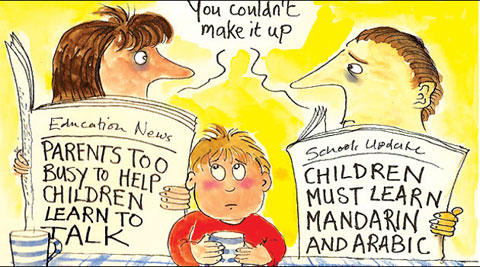Kill my language, softly…
 Lately, I came across an US organisational website called
‘Ethnologue’ which provides a broad picture of world’s most endangered
languages. Stunning figures show what kind of linguistic world we live
in. Lately, I came across an US organisational website called
‘Ethnologue’ which provides a broad picture of world’s most endangered
languages. Stunning figures show what kind of linguistic world we live
in.
As Ethnologue presents, 6% of the world's languages are spoken by 94%
of the world's population. The remaining 94% of languages are spoken by
only 6% of the population. The largest single language by population is
Mandarin (845 million speakers) followed by Spanish (329 million
speakers) and English (328 million speakers). And, 133 languages are
spoken by fewer than 10 people.
An estimated 7,000 languages are being spoken around the world. But
that number is expected to shrink rapidly in the coming decades. What is
lost when a language dies?
In 1992 a prominent US linguist stunned the academic world by
predicting that by the year 2100, 90% of the world's languages would
have ceased to exist. Linguists of worldwide are cautious about the way
English is progressing as it may eventually kill most other languages.
As globalisation sweeps around the world, it is perhaps natural that
small communities come out of their isolation and seek interaction with
the wider world.
The number of languages may be an unhappy casualty and the loss is
essentially an enormous cultural heritage, the way of expressing the
relationship with nature, with the world, between themselves in the
framework of their families, their kin people.

It's also the way speakers express their humour, their love, their
life. It is a testimony of human communities which is extremely
precious, because it expresses what other communities than ours in the
modern industrialized world are able to express.
Languages are not simply a collection of words. They are living,
breathing organisms holding the connections and associations that define
a culture. When a language becomes extinct, the culture in which it
lived is lost too. The value of language as a cultural artefact is
difficult to dispute, but is it actually realistic to ask small
communities to retain their culture?
Some linguists have argued that the social and economic conditions
among some groups of speakers “have changed to points of no return”. As
cultures evolve, groups often naturally shift their language use. Asking
them to hold onto languages they no longer want is more for the
linguists’ sake than for the communities themselves.
On the other hand, as of the close links between language and
identity, if people begin to think of their language as useless, they
see their identity as such as well.
This leads to social disruption, depression, suicide and drug use, as
further sociolinguists claim. And as parents no longer transmit language
to their children, the connection between children and grandparents is
broken and traditional values are lost.
An increasing number of communities are giving up their language by
their own choice. Many believe that their languages have no future and
that their children will not acquire a professional qualification if
they teach them tribal languages.
We can do nothing when the abandonment of a language corresponds to
the will of a population.
Hebrew was a dead language at the beginning of the 19th century. It
existed as a scholarly written language, but there was no way to say “I
love you” and “pass the salt”.
But with the “strong will” of Israeli Jews, the language was brought
back into everyday use.
Now it is undeniably a living breathing language once more. Welsh of
UK and Maori of New Zealand are also two dead languages which have been
revived back successfully.
As Buddhists, we believe that nothing is permanent. Death of a
language is just a part of the circle of life.
|



